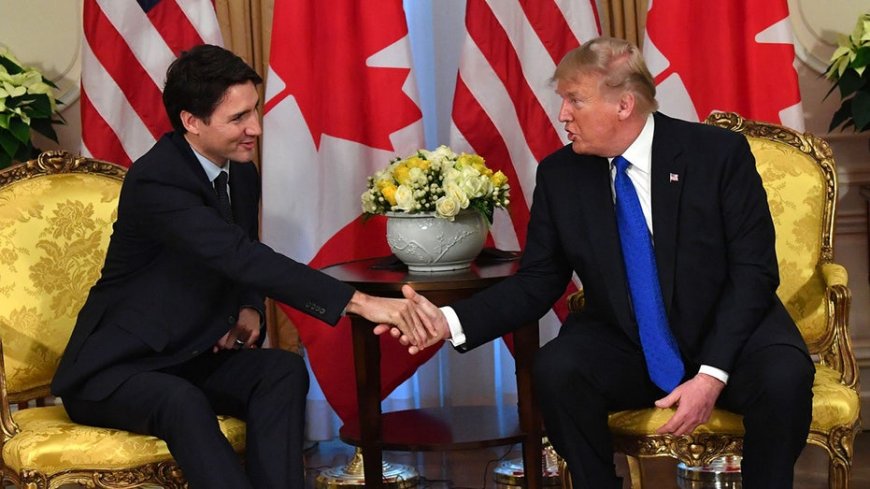Canadian PM Justin Trudeau visits Trump at Mar-a-Lago amid steep tariff threats: report
President-elect Trump and Canadian Prime Minister Justin Trudeau were meeting on Friday at Trump's Florida's estate amid threats of trade wars.

Canadian Prime Minister Justin Trudeau has flown to Florida to meet with President-elect Trump at his Mar-a-Lago club after Trump threatened to impose sweeping tariffs on Canadian products.
A person familiar with the matter, according to the AP, said Trudeau will have dinner with Trump. The official was not authorized to speak publicly about the matter and spoke on condition of anonymity.
Canadian Public Safety Minister Dominic LeBlanc accompanied Trudeau on the trip. Trudeau is the first G-7 leader to visit Trump since the U.S. election.
The visit comes days after Trump threatened to impose 25% tariffs on Canada and Mexico over failures by both nations to curb the flow of illegal immigrants and illicit drugs from those countries into the U.S.
Fox News Digital has reached out to Trump's representatives.
MEXICAN PRESIDENT MIGHT BE CHANGING VIEW ON US AS TRUMP WIN SENDS WARNING TO RULING SOCIALISTS
Trudeau said earlier Friday that he would resolve the tariff issue by talking to Trump.
"We’re going to work together to meet some of the concerns," he told reporters in Canada's Prince Edward Island. "But ultimately it is through lots of real constructive conversations with President Trump that I am going to have, that will keep us moving forward on the right track for all Canadians."
Trudeau said Trump got elected because he promised to bring down the cost of groceries, but now he's talking about adding 25% to the cost of all kinds of products, including potatoes from Prince Edward Island.
"It is important to understand that Donald Trump, when he makes statements like that, he plans on carrying them out. There’s no question about it," Trudeau said.
Earlier in the week, Trump said he would impose the tariffs on America's neighbors on the first day of his presidency.
"Right now a Caravan coming from Mexico, composed of thousands of people, seems to be unstoppable in its quest to come through our currently Open Border," he wrote. "On January 20th, as one of my many first Executive Orders, I will sign all necessary documents to charge Mexico and Canada a 25% Tariff on ALL products coming into the United States, and its ridiculous Open Borders."
On Wednesday, Trump spoke with Mexican President Claudia Sheinbaum Pardo. He said Sheinbaum agreed to "stop Migration through Mexico, and into the United States," following a productive discussion over the phone.
Sheinbaum had promised to raise tariffs on U.S. goods if Trump followed through with his threat.
Trump has previously urged Canada and Mexico to do more to prevent illegal migration into the U.S. and to combat the flow of illegal drugs, in particular fentanyl.
Shortly after Trump's tariff promises, Canadian officials said the country places the "highest priority" on border security.
"Our relationship today is balanced and mutually beneficial, particularly for American workers," Canada’s Deputy Prime Minister Chrystia Freeland and Public Safety Minister Dominic LeBlanc said in a joint statement. "Today, Canada buys more from the United States than China, Japan, France, and the U.K. combined. Canada is essential to US domestic energy supply, and last year 60 percent of U.S. crude oil imports originated in Canada."
About 60% of U.S. crude oil imports are from Canada, and 85% of U.S. electricity imports are from Canada.
Canada is also the largest foreign supplier of steel, aluminum and uranium to the U.S., and has 34 critical minerals and metals that the Pentagon deems vital for national security.
Should Trump follow through on his tariff threat, Canada could impose retaliatory tariffs on certain U.S. goods, a senior Canadian official told The Associated Press this week.
When Trump imposed higher tariffs during his first term, other countries responded with tariffs of their own. In 2018, Canada announced billions in duties against the U.S. in response to taxes on Canadian steel and aluminum.
The Associated Press contributed to this report.


























































